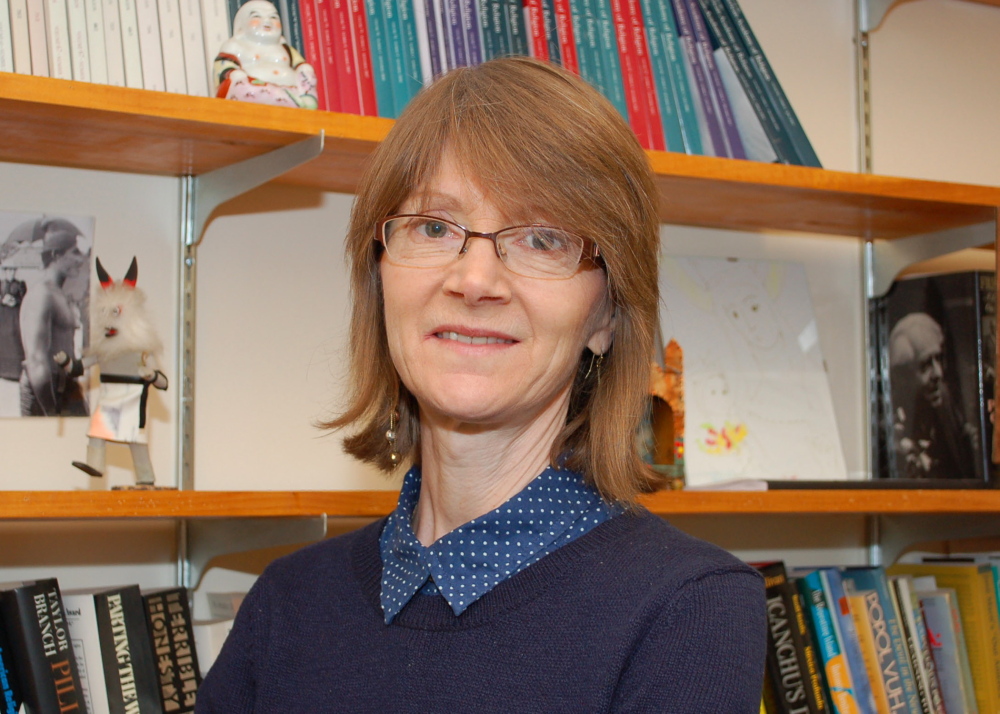A University of Maine at Farmington professor has been awarded a prestigious fellowship to study the role of religious beliefs in land rights cases involving indigenous people in former British colonies.
The professor of religion, Jennifer Reid, said as a fellow with the Guggenheim Foundation, she does not want to produce an isolated body of scholarship, but instead wants to use her knowledge of religion to engage socially with the struggle for land rights.
“We can’t simply be studying things and publishing essays. If we have skills and knowledge, we should be sharing them and using them,” she said Tuesday afternoon.
Described as “mid-career” awards by the Guggenheim Foundation, the fellowships are awarded to those scholars who already have demonstrated exceptional abilities, and the award is intended to further their scholarship.
Reid, a UMF faculty member for 20 years, was named to the 2015 Guggenheim class of fellows based on her project “Rethinking Religion: Indigenous Land Rights in a Secular Age.”
She was among 3,500 to 4,000 applicants for the fellowship. After learning she was one of about 200 who were chosen, “I nearly fell off my horse, honestly,” Reid said.
According to her research, indigenous peoples the world over are struggling for legal recognition of their land claims. The claims have had limited success in the courts, she said, because courts generally refuse to recognize indigenous religious values as comparable to the traditional British way of approaching property rights. Historians and anthropologists already have been brought to the table on indigenous land rights, but Reid said religious scholars also have a role to play in the struggle.
She said the court proceedings are focused on the European tradition of property, “which means who owns the property and who is using it.”
Reid said that indigenous relationships with land, however, often have a religious connection that doesn’t translate into the court systems.
“Christianity or Judaism are portable in some ways. You can build a church anywhere. For indigenous people, their religious life is very much tied up on particular spaces and places. They can’t just pick up their whole universe and re-establish somewhere else,” she said.
She said in the legal conversations about land rights, religious scholars are uniquely suited to get involved and offer their research.
“What they share is a long-term relationship with a piece of land, having particular languages and cultures and having all those things assaulted during the colonial period,” she said.
With the fellowship, Reid said she will continue to do research on the relationship between religion and land rights, but also take the next step in the process by going to some of the places to talk with indigenous lawyers and land rights activists about their experience in the legal system and to learn what role religious scholars can play in legal adjudication of indigenous land claims.
During the course of her fellowship, she will be speaking with indigenous lawyers and land rights activists in the United States, Canada and Australia.
A land claim by some Indian tribes in Maine for much of the state’s land area was resolved through enactment of the federal Maine Indian Claims Settlement Act in 1980, which included a monetary settlement for the tribes in exchange for giving up the claims.
Reid said she is thankful for being able to work at UMF, where she was able to engage in serious research while learning from her interactions with students.
“Jennifer is an outstanding scholar and a highly regarded, long-time faculty member who brings a wonderful compassion and intellectual prowess to UMF,” said UMF President Kathryn Foster in a news release. “We couldn’t be prouder to have her important work recognized by this premier fellowship program.”
Kaitlin Schroeder — 861-9252
Send questions/comments to the editors.


